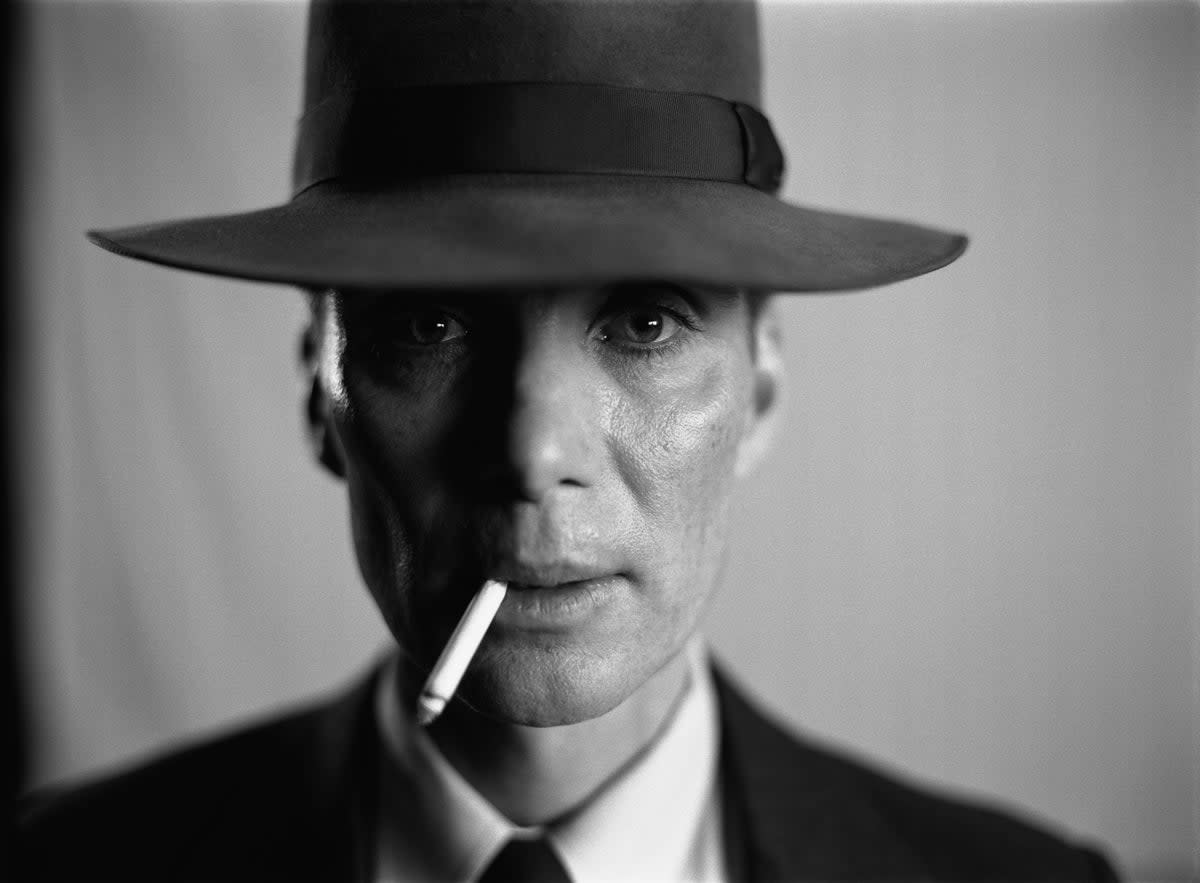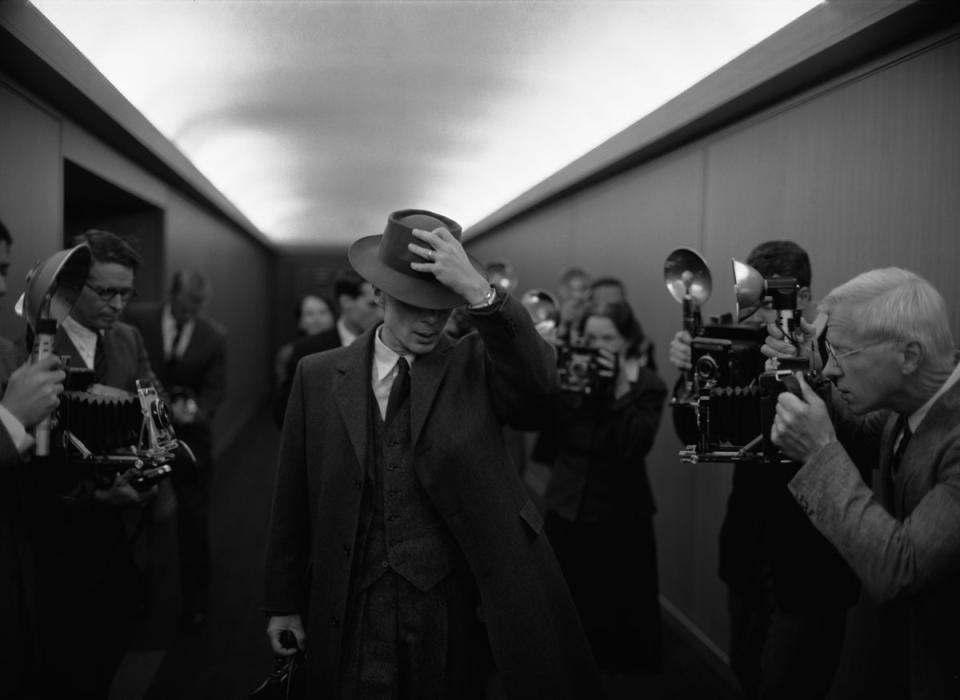Oppenheimer: the film telling the true story of the man who invented the atom bomb

The teaser trailer for Christopher Nolan’s upcoming film, Oppenheimer, is a real spine-tingler.
There’s an explosion and a red, black and orange cloud billows and thunders on screen. The sequence then flashes to the eye of J Robert Oppenheimer (played by Cillian Murphy), the theoretical physicist who is credited with the creation of the atomic bomb.
“We imagine a future and our imaginings horrify us. They won’t fear it, until they understand it, and they won’t understand it, until they’ve used it,” he says over the rest of the trailer.
“Theory will take you only so far. I don’t know if we can be trusted with such a weapon. But we have no choice.”
This is Nolan’s take on the true story of the creation of the atomic bomb – the weapon that would be dropped on Hiroshima and Nagasaki in 1945.
The atomic bomb marked a shift in human capability and cruelty, as well as creativity. The film provokes questions – the same question the scientists were asking at the time – about power, morality and ambition.
It will be the award-winning director’s first film since Tenet in 2020. The film has a starry cast including Emily Blunt and Matt Damon. It’s a thrilling topic for Nolan, who is known for the size and ambition of his projects, to take on.
Here we breakdown the true story behind the forthcoming biopic.
What was the Manhattan Project?
The Manhattan Project was a US-led government research project which was active from 1942 to 1946 and was disbanded the following year. The organisation developed the atomic bomb, the first of which (the Trinity test) was tested in New Mexico in July 1945. The second and third were dropped on Hiroshima and Nagasaki just a month later.
The idea of the project was to try and find the means to use the fission process, which had been discovered in December 1938, for military purposes. Over its short existence, the Manhattan Project grew exponentially, eventually employing as many as 130,000 people and costing $2 billion to run (approximately $23 billion in today’s money).
Who is Oppenheimer?
J Robert Oppenheimer was born in New York City in 1904, the son of secular German-Jewish immigrants – his mother was a painter and his father was a textile importer. He was brilliant at school, skipping eighth grade completely and completing several other grades in one year. He went to Harvard, majoring in chemistry and would go to Cambridge for further study.
He was a depressive and a heavy smoker, who reportedly did not eat while he was in his darkest moods. He was also apparently incredibly clumsy in the lab, which was one of the reasons why he pursued theoretical rather than experimental physics. He completed his PhD at the University of Göttingen and then began his career with a fellowship at Caltech in 1927.
He immediately enjoyed a glistening and enriching academic career, spending time at the University of Leiden, the Swiss Federal Institute of Technology (ETH) and becoming an associate professor at Berkeley when he returned to the US. In 1936, he was promoted to full professor. At the time he also worked closely with Nobel-prize-winning physicist Ernest O Lawrence - the beginning of many fruitful collaborations. He married Katherine Vissering Puening in 1940. They had two children and remained together until his 1967 death aged just 62 from throat cancer.
For much of his early life, Oppenheimer was apparently so involved in his scientific research that he was not aware of much that was going on in the outside world. For example, he did not read newspapers or listen to the radio and only heard about the 1929 Wall Street Crash six months after it had happened.
However, from the mid-1930s he became more engaged with the world. He started supporting social reforms and donated money to progressive causes. He never joined the Communist Party, but was said to have given money to people who had. These associations would later come to harm him: Oppenheimer was investigated by both the FBI and the Manhattan Project’s own internal security arm from 1941 onwards and the investigations would culminate in the scientist being stripped of his security clearance in 1954.
In May 1942, one of Oppenheimer’s Harvard professors, who was then the National Defense Research Committee Chairman, brought Oppenheimer in to work on neutron calculations for a new atomic bomb – the project had been given the green light by President Roosevelt in 1941. In June, the Manhattan Project was created, Oppenheimer became the first director of its laboratory, The Los Alamos Laboratory, and the rest is history.

Oppenheimer, it seems, was aware of the historical repercussions of the project. Several days before the Trinity test went ahead, he apparently shared his thoughts using a verse from Hindu linguistic philosopher Bhartá¹hari’s Åatakatraya. It said: “In battle, in the forest, at the precipice in the mountains / On the dark great sea, in the midst of javelins and arrows / In sleep, in confusion, in the depths of shame / The good deeds a man has done before defend him.”
Oppenheimer was a cultivated scholar whose interest in Hinduism led him to read the Hindu text the Bhagavad Gita in its original Sanskrit (he had begun to learn the language in 1933). In a 1965 TV interview, he shared a line from the scripture which has come to be closely associated with him. He said that after the Trinity test, the line that ran through his mind was: “I am become Death, the destroyer of worlds.”
According to the New York Times, he continued to be plagued by the moral repercussions of his role in the creation of the bomb. He reportedly told fellow physicists that: “In some sort of crude sense which no vulgarity, no humour, no overstatements can quite extinguish... the physicists have known sin; and this is a knowledge which they cannot lose.”
However, in 1961 he would say: “I carry no weight on my conscience... Scientists are not delinquents.
“Our work has changed the conditions in which men live, but the use made of these changes is the problem of governments, not of scientists.”
Oppenheimer was nominated three times for the Nobel prize (in 1945, 1951 and 1967) but never won. While being one of the minds that created the atomic bomb, he would eventually lobby for the restriction of the use of nuclear weapons.
What do we know about Christopher Nolan’s new film?
Christopher Nolan – the director that brought audiences Inception, the Dark Knight trilogy, Interstellar, Dunkirk and Tenet – now takes on Oppenheimer’s story.
The biographical film starring Cillian Murphy as Oppenheimer is based on the 2005 book American Prometheus: The Triumph and Tragedy of J Robert Oppenheimer by Pulitzer Prize-winning journalist Kai Bird and historian Martin J Sherwin. The film will explore the life of the physicist whose work changed the world.
Alongside Murphy, whose last full-length film was 2020’s A Quiet Place Part II, the film will star Emily Blunt as Katherine, the German biologist and Oppenheimer’s wife, Matt Damon as US officer and Manhattan Project director Leslie Groves, and Robert Downey Jr as Lewis Strauss, a major player in the development of nuclear weapons and the man who oversaw the 1954 security hearing which resulted in Oppenheimer’s Q clearance (the US Department of Energy’s top secret security clearance) being removed.
Florence Pugh is also set to star as the psychiatrist and journalist Jean Tatlock, who was also Oppenheimer’s lover, while Uncut Gems director Benny Safdie will play physicist Edward Teller. Rami Malek, Josh Hartnet, Gary Oldman, Casey Affleck and Kenneth Branagh will also all have roles in the forthcoming film.
Murphy and Nolan are longtime collaborators, having worked together on Inception, Batman Begins and Dunkirk. Ludwig Göransson, who created the soundtrack for 2018’s Black Panther, Venom and 2020’s Tenet is composing the score.
What has Nolan said about the film?
Nolan is known for the ambitious nature of his projects and extraordinary set pieces – for Tenet he crashed a real-life 747 into a building – but Oppenheimer is arguably his most ambitious project to date. In an interview with Total Film, Nolan, who much prefers using physical effects rather than CGI, said: “I think recreating the Trinity test without the use of computer graphics, was a huge challenge to take on.”
He continued: “It’s a story of immense scope and scale... And one of the most challenging projects I’ve ever taken on in terms of the scale of it, and in terms of encountering the breadth of Oppenheimer’s story. There were big, logistical challenges, big practical challenges.”
Speaking about the narrative itself, Nolan said: “We’re trying to tell the story of somebody’s life, and their journey through personal history and larger-scale history... And so the subjectivity of the story is everything to me. We want to view these events through Oppenheimer’s eyes.”
IMAX also created a new black-and-white kind of film for Oppenheimer. Nolan said: “We challenged the people at Kodak photochem to make this work for us... And they stepped up. For the first time ever, we were able to shoot IMAX film in black-and-white. And the results were thrilling and extraordinary.”
Oppenheimer in popular culture
Oppenheimer was the subject of a seven-part BBC-produced miniseries in the Eighties, which had Sam Waterston playing Oppenheimer.
Then in 2014 the American series Manhattan, which imagined the lives of the scientists who were working at The Los Alamos Laboratory, premiered on WGN America. It ran for two series and starred Daniel London (The Bridge to Nowhere) as Oppenheimer.
The same year, the scientist became the subject of a Royal Shakespeare Company play by Tom Morton-Smith. After a critically acclaimed sell-out run in Stratford-upon-Avon, it transferred to the Vaudeville Theatre in London where it ran from March to May in 2015.
John Heffernan, who had previously played principal roles in Edward II and Saint George and the Dragon at the National Theatre, played Oppenheimer.
At the time the Standard said: “This is the second time I’ve seen Oppenheimer and the scale of its achievement seems even greater: ambitious writing, stylishly directed and impeccably performed by an ensemble of 20 actors.”
Another British newspaper said: “Morton-Smith neither eulogises nor condemns Oppenheimer: he simply shows him as a flawed human being aware that he has the scientific capacity ‘to murder every last soul on the planet’.”
Oppenheimer is set to be released in the UK on July 21, 2023

 Yahoo Movies
Yahoo Movies 
